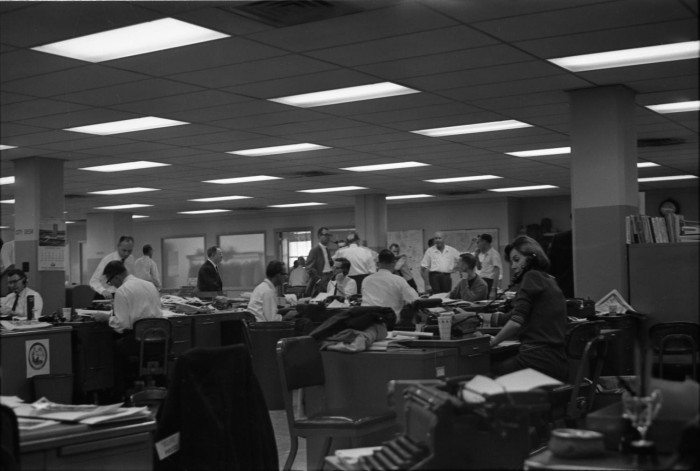
State of the Media: Building a Better Punditocracy

A version of this story ran in the May 2015 issue.
Above: Dallas Times Herald newsroom on the night of November 22, 1963.
If you read or listened to any daily coverage of Texas politics last year, chances are good you came across the perspective of Cal Jillson, a political scientist at Southern Methodist University whose quotes appeared in 44 percent of state political coverage from June until December 2014.
Chances are also good that even if you didn’t come across a Jillson quote, you encountered a quote provided by someone who—speaking demographically—looks a lot like him.
That’s according to a new report from the Texas Research Institute (TRI), a lefty nonprofit think tank associated with Progress Texas. The TRI report found that seven political scientists—all white guys, all from either Dallas-Fort Worth, the Rio Grande Valley or Houston—dominated political pages and airwaves during the second half of last year, when Democrats Leticia Van de Putte and Wendy Davis were vying for offices in the Texas Capitol against an all-male, and almost all-white, statewide Republican ticket.
“Texas is a very diverse state, and that diversity is not being reflected in the media coverage,” said Beth Hernandez, a TRI board member who told the Observer that the report is meant to encourage journalists to “seek out other voices” more demographically representative of Texas.
Maybe it’s not surprising that white guys’ opinions are overrepresented in political coverage, given that white guys are overrepresented in politics generally.
Women slightly outnumber men in Texas at 50.3 percent of the population, but 80 percent of Texas legislators are men.
Women slightly outnumber men in Texas at 50.3 percent of the population, but 80 percent of Texas legislators are men. Texas’ population is 44 percent white; the Lege is 65 percent white.
If Texas politics is a white guy’s game, is it any wonder that commenting on politics is also a white guy’s game? Particularly when producing news is a white guy’s game? According to the American Society of News Editors, newsrooms have actually become slightly less diverse over the last 10 years or so, with men making up two-thirds of newsroom staff nationwide, and non-white journalists accounting for just under 13 percent of newsroom staff.
What we have here is a lot of white guys calling a lot of white guys to talk about a lot of white guys.
Of course, it isn’t hard to understand why a reporter of any race or gender would enjoy having an easily accessible, reliable quote-generator of any race or gender on the other end of the line, particularly when we’re talking about overburdened daily reporters covering more angles than ever in increasingly pared-down newsrooms. Deadlines don’t care about demographics.
Nevertheless, media representation is important, and when white guys are the loudest voices in political coverage, it reinforces the idea that white guys are more reliable or objective commentators on political goings-on than are, say, women of color—who also happen to be the people least represented in elective offices here in Texas.
To my mind, these two things are connected. The conversations we have about politics shape how we vote, for whom we vote, and whom we expect to be reliable and productive elected officials. It’s partially how I reconcile the still-confounding fact that Texas voters found Dan Patrick to be a more promising lieutenant governor than the infinitely more qualified Van de Putte.
I’ll add this suggestion: When reporters call the Cal Jillsons of the world, those guys need to pass the phone.
TRI asking journalists to be more mindful about whom they tap for quotes is a fine idea. However, I wouldn’t put the onus for instigating change entirely on reporters and their editors. I’ll add this suggestion: When reporters call the Cal Jillsons of the world, those guys need to pass the phone.
It’s no doubt flattering to become a leading name in political commentary, and it probably helps sell books and fill lecture hall seats, but there’s a point at which Texas’ leading handful of prominent white guy political scientists should seriously consider handing off the mic to their qualified colleagues of color, especially women of color.
Particularly when the outcomes of the political races that we so often ask white guys to comment on have real effects for some of the most marginalized Texans. These Texans aren’t proportionately represented in the Legislature—a body that spends a good deal of its time trying to prevent transgender Texans from using the appropriate public bathrooms, or to keep immigrants from attending college, or to block women’s access to abortion care—and they aren’t well represented in our media.
We’re far better off talking to marginalized Texans than talking about them, and the responsibility to make sure we do is something that journalists and the media-savvy commentators they love should share.


